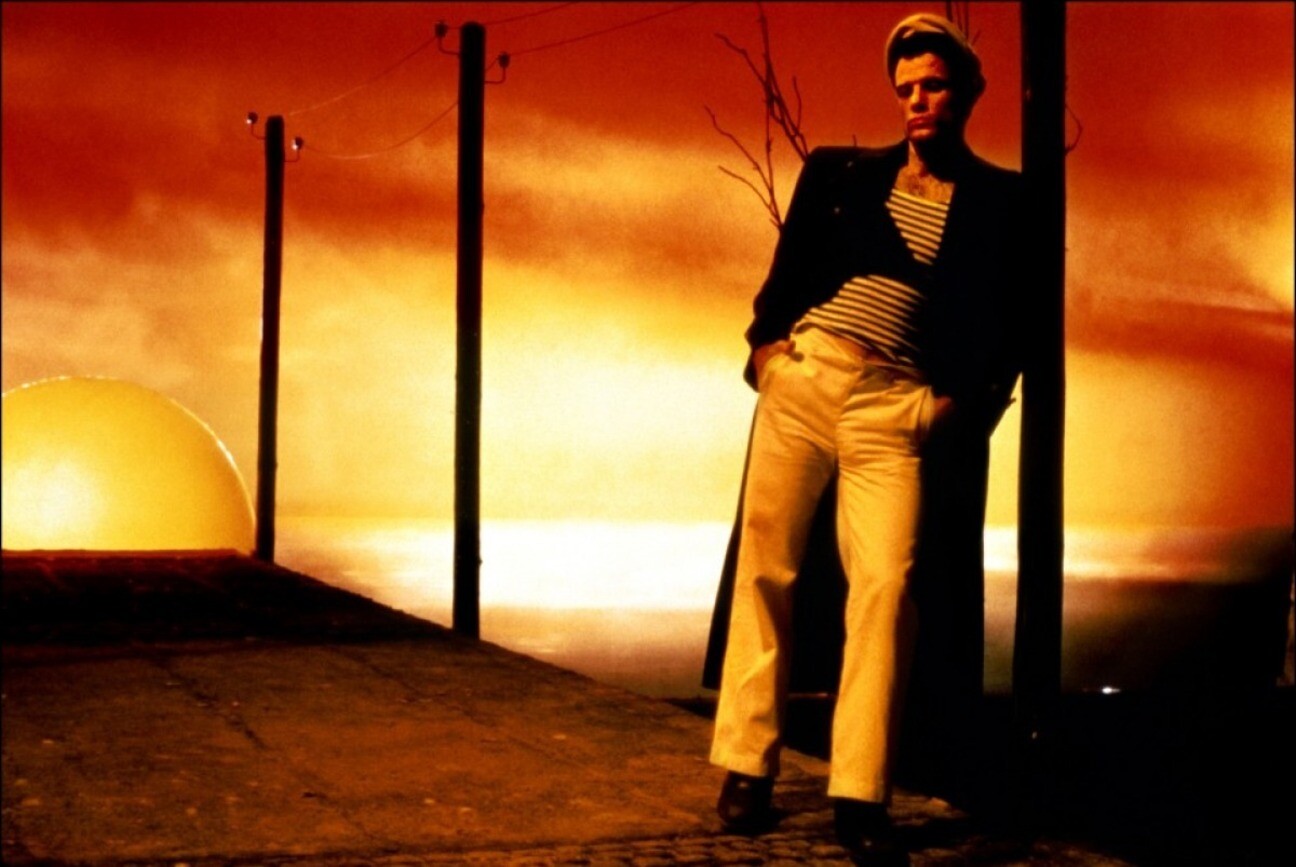

Rainer Werner Fassbinder, (still) Querelle, 1982.
1.
Contrary to popular opinion, the making of an authentic film from a piece of literature is in no sense simply a matter of accomplishing the most “congenial” possible translation from one medium, literature, into the other, film. Cinematic transformation of a literary work should never assume that its purpose is simply the maximal realization of the images that literature evokes in the minds of its readers.1
Such an assumption would, in any case, be preposterous, since any given reader reads any given book with his own sense of reality, and therefore any book evokes as many different fantasies and images as it has readers.
There is no such thing as the ultimate objective reality for any work of literature. Consequently, the intention of a film that tries to come to grips with literature cannot be the realization of the author’s world of images in some fixed and final consensus of separate and contrary fantasies. Any attempt to turn a film into a substitute for literature must inevitably result in a compound fantasy based on the lowest common denominator and will therefore, by definition, be a mediocre and lifeless product.
A film that comes to grips with literature and language has to make of this confrontation something absolutely intelligible, clear, and transparent. Not for a single moment may it turn its own fantasy into a composite one. Always, at every stage, it must make it clear that this is but one possible way of dealing with a work of art in another medium. This is the only way:
— through an unequivocal and single-minded questioning of the piece of literature and its language;
— by scrutinizing the substance and the posture of the author’s work;
— by developing an imagination instantly recognizable as unique;
— and by abandoning any futile attempt at “consummating” the work of literature.
This is the only way to turn literature into film.
2.
As far as discrepancy between objective plot and subjective fantasy is concerned, Jean Genet’s Querelle de Brest may be the most radical novel in world literature. On the surface, its story, when divorced from Genet’s world of images, is a fairly uninteresting (in fact, third-class) tale about a criminal, and as such it is hardly worth our while.
What is worthwhile is to confront Jean Genet’s narrative method, his extraordinary imagination, which conjures up a world that seems alien at first, a world in which singular laws seem to be in force, in the service of an astonishing mythology.
It is tremendously exciting to discover, at first slowly and then more and more compellingly, how this strange world with its own peculiar laws relates to our own subjective sense of reality, how it brings surprising truths to the surface of this subjective reality of ours by forcing us (and I am fully aware of the pretentiousness of this notion) toward certain recognitions and decisions that, no matter how painful they may seem to be, bring us closer to our own lives.
This also means that we get closer to our own identities.
Only those who are truly identified with their own selves no longer need to fear fear. And only those who are rid of their fear are capable of loving nonjudgmentally. The ultimate goal of all human endeavor: to live one’s own life.
3.
I cannot form a picture of the world of Jean Genet, and consequently of my own treatment of it, in its original settings. That is because every action that takes place within this world, every gesture, means something else; in each case it is something essentially more, something greater, generally something sacred.
For this reason Rolf Zehetbauer and I have decided that the film of Jean Genet’s Querelle will take place in a kind of surreal landscape. It will be a composite of the specific segments and signals of all the settings referred to by Genet. Within this landscape there will be several walls for projection. They will enable us to project particles of the real world into this artificial world, and thereby to expand it infinitely.
Another essential reason for using such a landscape is that for each separate scene there will then be the possibility of bringing any one of the other motifs into that central image and having it function as a sort of counterpoint to the action. Whether it will then act merely as a contrapuntal motif, or take over as the setting for the action, is something to be determined from situation to situation.
1982
In “Preliminary Remarks on Querelle,” Fassbinder outlines his approach to Jean Genet’s Querelle de Brest emphasizing the necessity of engaging with the novel’s radical subjectivity and mythological dimensions rather than attempting its literal adaptation into a film. Querelle (1982), Fassbinder’s final film, completed shortly before his death, reflects this vision through its stylized, theatrical landscapes and heightened performances translating Genet’s themes of homoerotic desire, betrayal, and power into a distinct cinematic language. “Preliminary Remarks on Querelle” was originally published in German as “Vorläufige Bemerkungen zu Querelle” in Die Anarchie der Phantasie: Gespräche und Interviews, edited by Michael Töteberg, Fischer Taschenbuch Verlag, 1986. It was later translated into English by A. S. Wensinger and Richard Wood and published in The Anarchy of the Imagination: Interviews, Essays, Notes, edited by Michael Töteberg and Leo A. Lensing, Johns Hopkins University Press, 1992.